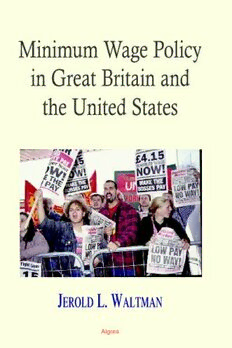
Minimum Wage Policy in Great Britain and the United States PDF
247 Pages·2008·1.127 MB·English
Most books are stored in the elastic cloud where traffic is expensive. For this reason, we have a limit on daily download.
Preview Minimum Wage Policy in Great Britain and the United States
Description:
In a thorough and well-documented study of the American and British experience with minimum wage legislation, Prof. Jerold Waltman describes and analyzes the operation of current minimum wage policies and politics in both countries. Where are we and how did we get here? For Britain, he chronicles the events leading up to the enactment of the National Minimum Wage, and then discusses its subsequent evolution. Turning to the United States, he covers the almost moribund but still important federal minimum wage, and then traces developments on the state and local front. Analyzing wage policies and the political ideas that underlie them, including the irony of an Iraq funding bill leading to a minimum wage increase, this book compares not only Federal but State minimum wage policies and those of Britain as well. Going beyond the debate on public expenditure programs, the author examines the future of the "welfare state" not from a perspective of entitlement but of citizenship in a public polity.Waltman takes up the accomplishments of the living wage movement in each nation. He then assesses whether or not contemporary advocates for heightened minimum wages are laying the groundwork for a rejuvenated welfare state. Are they fashioning a public philosophy that will make the minimum wage once again a central feature of the welfare state, or are they heading down other paths?Providing a context within which to evaluate opposing policy proposals, he also discusses the general aspects of minimum wage policy and examines in detail the history of minimum wages in the two countries.
See more
The list of books you might like
Most books are stored in the elastic cloud where traffic is expensive. For this reason, we have a limit on daily download.
